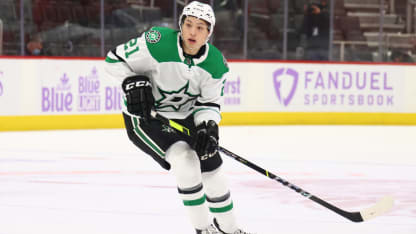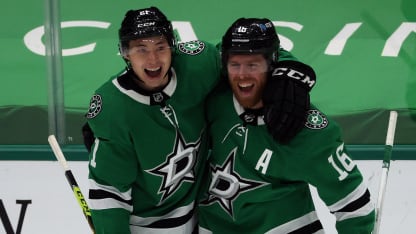Editor's note: The NHL is celebrating Asian and Pacific Islander Heritage Month in May by highlighting the history and growing impact of people of Asian and Pacific Islander heritage at all levels of hockey. Today, a look at Dallas Stars rookie Jason Robertson, who is Filipino American.
Robertson of Stars embraces being role model for Asian Americans
Calder Trophy contender sees 'important' opportunity to help promote game

© Gregory Shamus/Getty Images
Jason Robertson got a refresher from his father last week about the influence he's having as an Asian American making an impact in the NHL.
Hugh Robertson told his 21-year-old son, a rookie forward with the Dallas Stars, about a father and his two young daughters of Japanese descent who were at American Airlines Center for the Stars' 4-3 overtime win against the Carolina Hurricanes on April 26, when Robertson assisted on Jamie Benn's overtime goal.
RELATED: [More Asian and Pacific Islander Heritage Month coverage]
"Jason got them tickets because the father is best friends with Jason's uncle and they've never been to a hockey game," Hugh Robertson said. "The girls were never exposed to hockey ever. They didn't know what it was. So they go, and Jason had a pretty good game, and for Dallas it was a really good game. We get a text the next day, and the 12-year-old told the dad that when she grows up she wants to be an NHL player. The 10-year-old girl said she's a big hockey fan and just wants to watch Dallas all the time now.
"I relayed all that stuff to Jason, and Jason's response was, 'That's really cool.' He never thought of that stuff."
He does now, more than ever before.
"Stuff like that, it's touching," Robertson said. "Those moments are special to me."
Robertson's younger brother, Nicholas Robertson, is a rookie with the Toronto Maple Leafs. They're from Arcadia, California, less than 20 miles from Staples Center. They grew up going to Los Angeles Kings games and became the first Filipino Americans to play in the NHL.
Jason Robertson is likely going to be at least a finalist for the Calder Trophy, given to the player voted NHL rookie of the year. He has scored 43 points (16 goals, 27 assists) in 48 games for the Stars, who are four points behind the Nashville Predators for the fourth and final Stanley Cup Playoff berth in the Discover Central Division with a game in hand entering their game against the Tampa Bay Lightning on Friday (7 p.m. ET; BSSUN, BSSW+, NHL.TV).
"There is a lot of press in the Asian community, and Jason and Nick both are like, 'Whatever we can do to promote hockey is terrific,' " Hugh Robertson said. "… If I'm an 8-year-old hockey fan and I see this man doing this, you're a role model. But you are still a person. People can be just grounded and that's how we like the kids to be, grounded, well spoken, respectful. They have to respect the game and they have to respect their fans."
Robertson certainly gained new respect for the game while with the Stars in the Edmonton bubble during the 2020 Stanley Cup Playoffs.
He added 15 pounds onto his 6-foot-3 frame during the two months. He called it "bubble weight."
Robertson, who played three regular-season games last season, never played a postseason game and skated in warmups twice, both times during the Stanley Cup Final in September. The Stars' second-round pick in the 2017 NHL Draft (No. 39) would skate for maybe 20 minutes, sometimes less, and not every day.
It was easy to gain weight.
"I had to take off the bubble weight and start putting on more hockey weight, get stronger in the lower body while also trimming down in the upper body," Robertson said. "That was something I wanted to do after the bubble because that was a long 2 1/2 months, and I can't say I was working out every day because I wasn't. It was more of a mental grind."
Robertson shed the weight in the first month after leaving. Training five to seven days a week with his brother in the Detroit area, he lost five more pounds during the offseason to get down to about 197 (he said he has been at 200-205 pounds for a while) while gaining the strength he felt he needed to make the Stars lineup on opening night.
He made it, but only because of injuries and a COVID-19 outbreak.
"He did not have a good training camp," Dallas coach Rick Bowness said. "We didn't trust him defensively. He had a lot to learn. He had that strength in January at camp, but he was getting pushed around."
Robertson played 11:53 in the opening game against the Predators on Jan. 22 and 7:35 in Dallas' second game two nights later, also against Nashville. Then he went on the taxi squad for five games.
"The confidence, my mental state, I don't even remember how it was but I'm sure it was just thoughts of not screwing up and trying not to overdo something," Robertson said. "I didn't know what my limitations were and I didn't know what I could test."
Robertson said he was confused because he didn't know what he had to do to get another chance.
"I remember having conversations with the staff and management and them saying it was a learning curve, and maybe in a month or two I'd be saying that was great for my development," he said. "Well, there you go."
Robertson returned to the lineup and scored his first NHL goal in his second game back, against the Chicago Blackhawks on Feb. 7, starting a five-game point streak (two goals, four assists). He scored again March 4, starting a hot stretch that has been arguably the biggest reason the Stars got back into the playoff race.
He has scored 37 points (14 goals, 23 assists) in 36 games since that day, when the Stars were last in the Central. More than two months later, they are still alive for a playoff berth.
"He does things offensively that we don't have any other forwards do, so we just made a commitment to play him," Bowness said. "His ability to make plays in tight around the net. His ability to get pucks through traffic and on the net. It's uncanny. He'll put passes through feet and sticks. He'll put passes over sticks. He'll find people."

© Ronald Martinez/Getty Images
Robertson plays left wing with center Roope Hintz and Joe Pavelski on what has been the Stars' most consistent line.
"I played a couple games with him last year, and you saw he was a playmaker, but you still really saw a young player that physically might not have been ready quite yet," Pavelski said. "I think the bubble was really good for him, being around all of us, seeing the game, and then I think a lot of credit goes to him. He went home and worked hard, put on some extra strength. When he came to camp, my first impression was he definitely matured. He was in more of the battles. He's playing on the inside a lot more. He's got that confidence to go into a corner and come out with the puck and hold a guy off. Those are the things that have helped him take his game to another level."
With success on the ice has come more prominence. Robertson embraces it.
He has gone to rinks in the Dallas area offering his time to help kids with their skills, his father said. He wants to use the platform he has as an NHL player to get more young people involved in the game.
"Of course, with COVID it's tough to do anything, but to do something with any kids is what I want to do when everything starts to settle down," Robertson said. "Nick and I want to do something for anyone, not just Asian American kids, because we want to grow the sport."
But he knows the Asian American community is watching, following and welcoming him as their new NHL fan favorite. It matters.
"When I got drafted that was probably the moment where my family, my mom and dad told me that you're going to be a role model because they're going to see a person like you and think, 'He made it, he did what he wanted to do, I can too,' " Robertson said. "That was the first time I really thought about it, and I've tried to embrace it since. It's important. It's truly special."

















